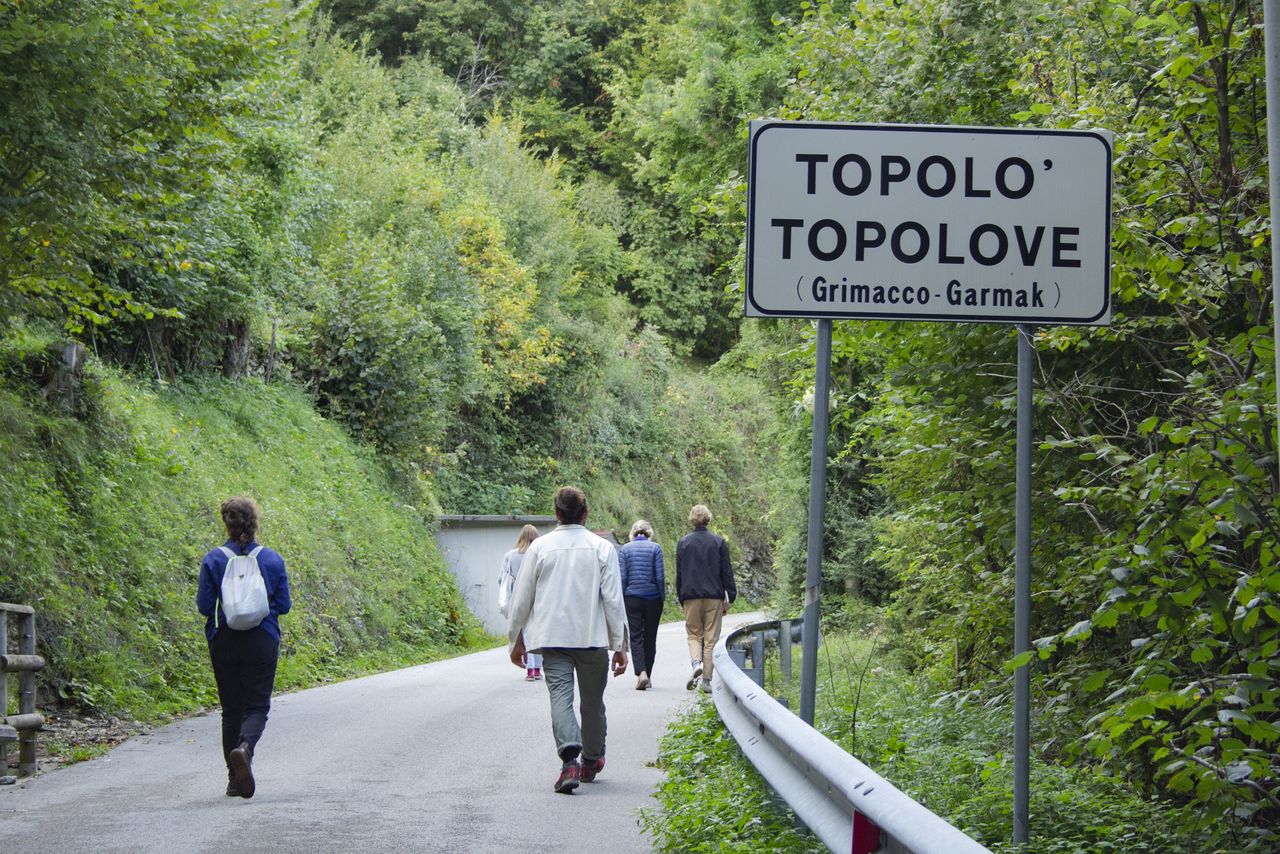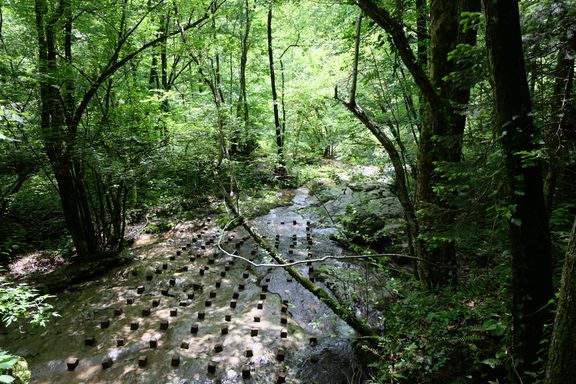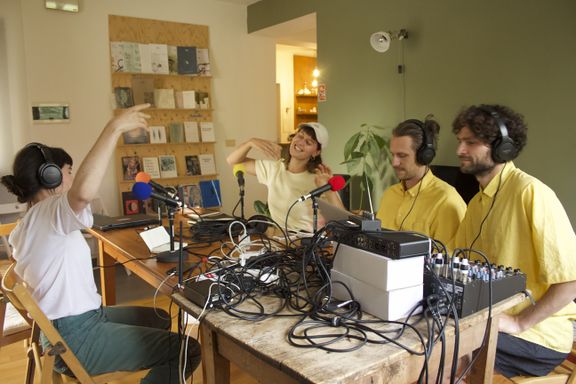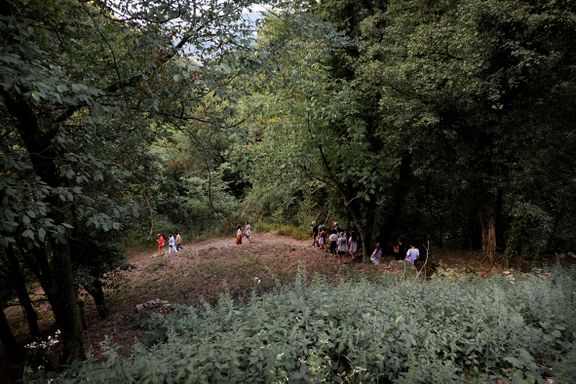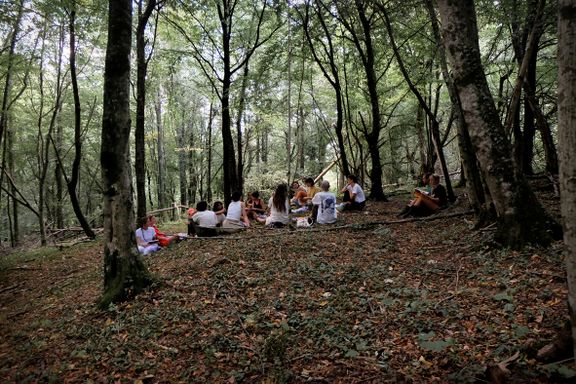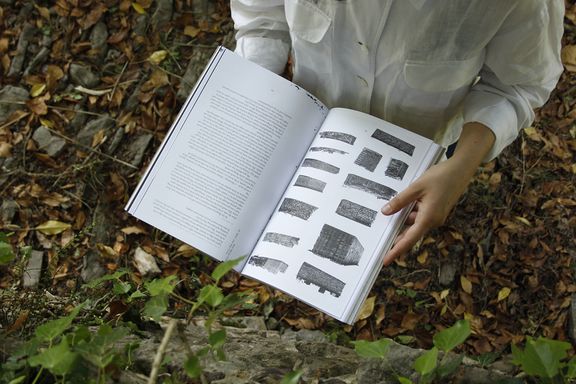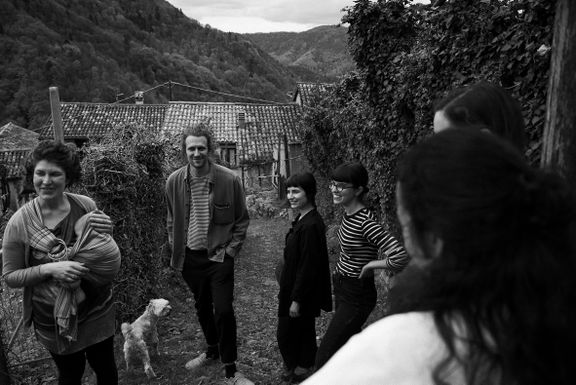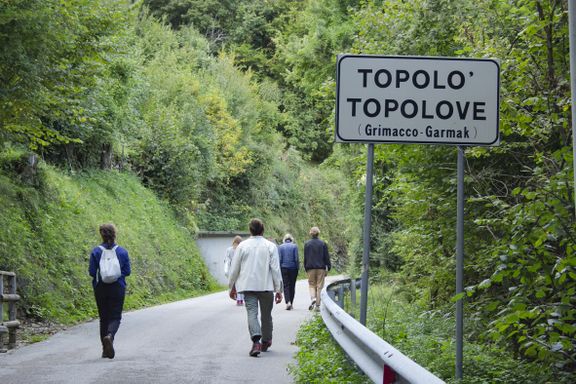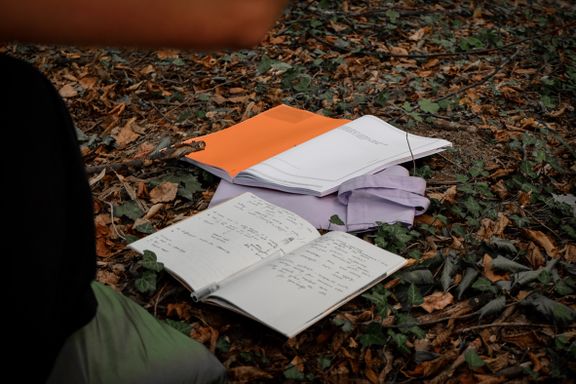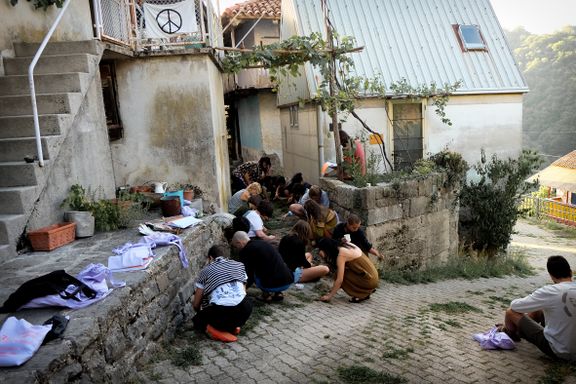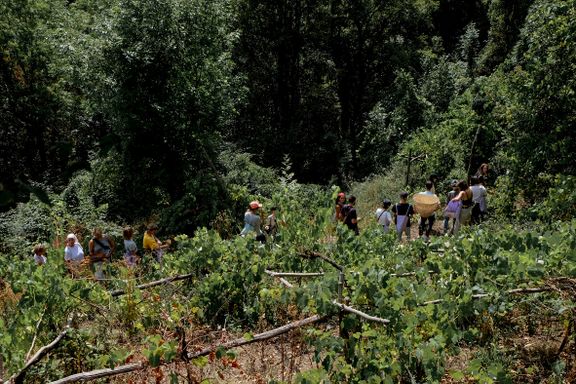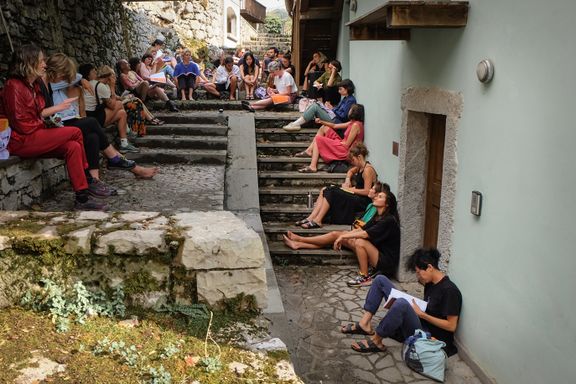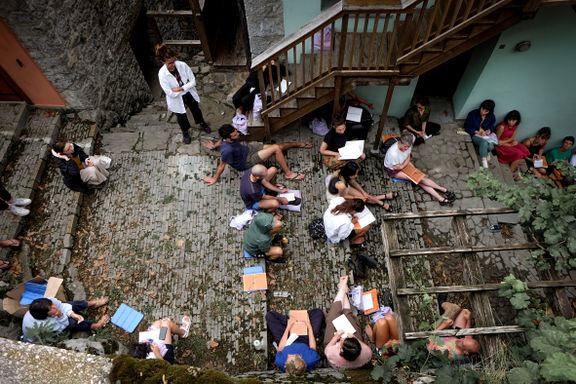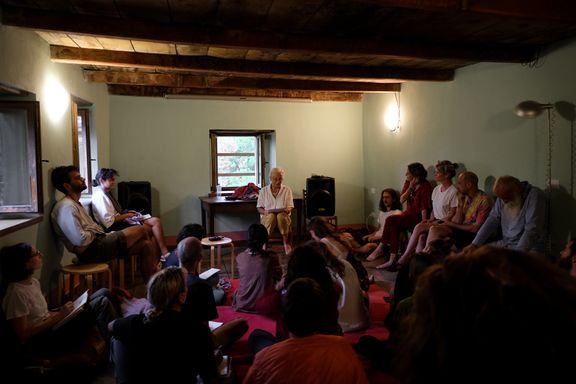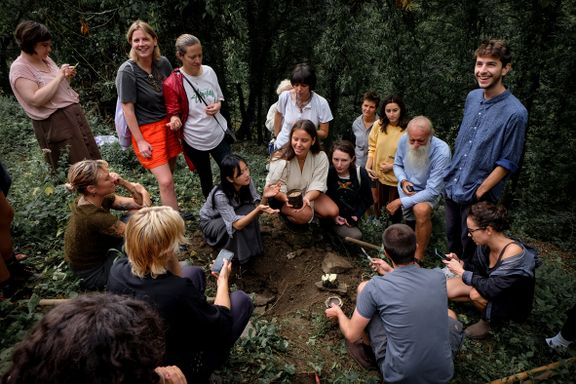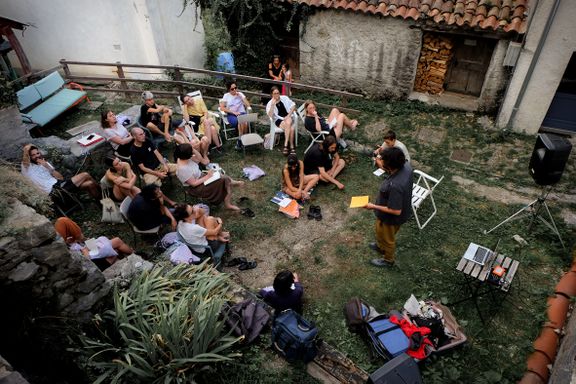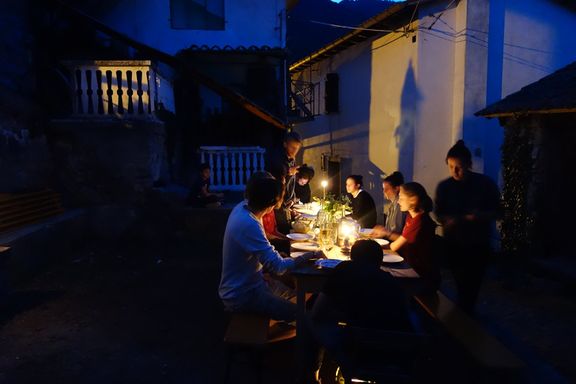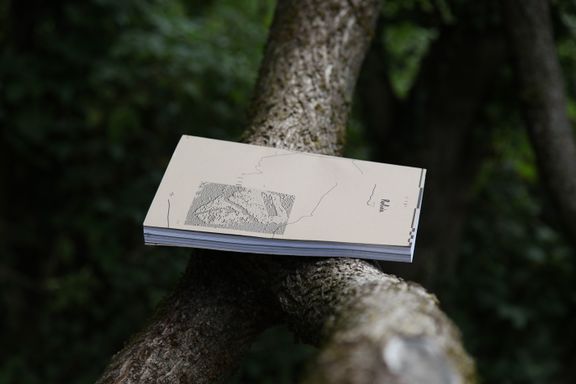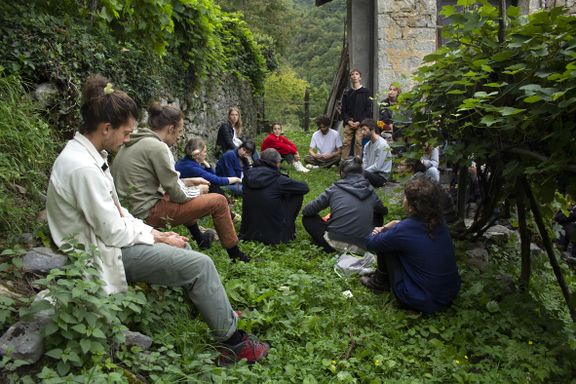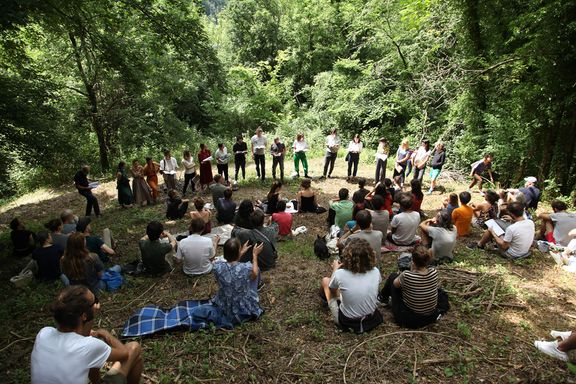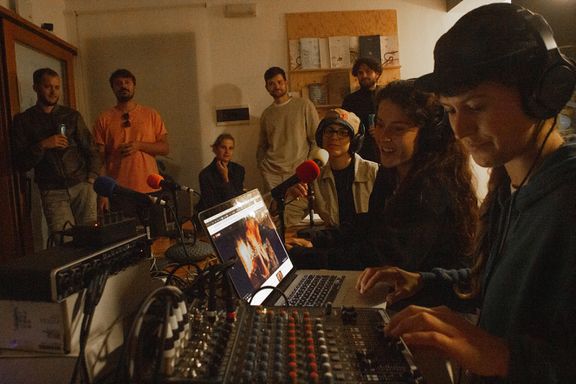Difference between revisions of "Robida"
| (14 intermediate revisions by the same user not shown) | |||
| Line 1: | Line 1: | ||
{{Article | {{Article | ||
| − | | status = | + | | status = |
| maintainer = Urška Savič | | maintainer = Urška Savič | ||
}} | }} | ||
| Line 37: | Line 37: | ||
{{Teaser | {{Teaser | ||
| − | | image = | + | | image = Robida 12 Photo by Tanja Marmai copy.jpg |
| | | | ||
Robida is a collective based in Topolò/Topolove, a village situated on the border between Italy and Slovenia. This region falls under Benečija, a place known for its Slovenian minority. The collective is international and multilingual and is known for its work that intersects written and spoken words. They have a range of projects, including Robida Magazine and Radio Robida, and also offer residencies and summer schools. The collective's curatorial approach emphasizes long-term projects that explore the connection between landscape and the place of Topolò/Topolove. Robida has its headquarters in a place named Izba, located at the center of the village. | Robida is a collective based in Topolò/Topolove, a village situated on the border between Italy and Slovenia. This region falls under Benečija, a place known for its Slovenian minority. The collective is international and multilingual and is known for its work that intersects written and spoken words. They have a range of projects, including Robida Magazine and Radio Robida, and also offer residencies and summer schools. The collective's curatorial approach emphasizes long-term projects that explore the connection between landscape and the place of Topolò/Topolove. Robida has its headquarters in a place named Izba, located at the center of the village. | ||
| Line 43: | Line 43: | ||
==Robida Collective== | ==Robida Collective== | ||
| − | The Robida Collective began their activities around 2015 in Topolò, a small village situated in a marginalized area of the Slovenian minority in Italy. As a curatorial collective, they always work with the concepts surrounding them and actively involve in the | + | The Robida Collective began their activities around 2015 in Topolò, a small village situated in a marginalized area of the Slovenian minority in Italy. As a curatorial collective, they always work with the concepts surrounding them and actively involve in the process of rethinking the dominant narratives and prevailent discourses of for example the margin of a margin or the otherness, the proximity of borders, and multilingualism. Their work encompasses a diverse range of artistic forms and is characterized by its poetic nature. While their backgrounds span architecture, design, humanities, philosophy, arts, music and literature, they combine their collective knowledge to create a cohesive entity. The core collective of approximately ten individuals continues to expand into an international community of the Robida Collective, serving as a vital network of interconnected artists working in various fields. |
| + | |||
| + | {{Image|14 Photo by Elena Rucli copy.jpg}} | ||
According to their own words, | According to their own words, | ||
<br>''Robida is commitment, dedication, concreteness, care and responsibility.''<br>''Robida is a way of learning from scratch to take care of one’s dreams.''<br>''Robida is a group of people with a great sense of community.''<br>''Robida is a platform for creating a place of belonging.''<br>''Robida is a space where to dig deeper into things.''<br>''Robida is a place for observation and reflection.''<br>''Robida is a project to connect people.''<br>''Robida is a place to experiment.''<br>''Robida is a laboratory.''<br>''Robida is relationships.''<br>''Robida is a cure.'' | <br>''Robida is commitment, dedication, concreteness, care and responsibility.''<br>''Robida is a way of learning from scratch to take care of one’s dreams.''<br>''Robida is a group of people with a great sense of community.''<br>''Robida is a platform for creating a place of belonging.''<br>''Robida is a space where to dig deeper into things.''<br>''Robida is a place for observation and reflection.''<br>''Robida is a project to connect people.''<br>''Robida is a place to experiment.''<br>''Robida is a laboratory.''<br>''Robida is relationships.''<br>''Robida is a cure.'' | ||
| + | |||
| + | {{Image|Robida 1-photo by Nik Erik Neubauer.jpg}} | ||
==Robida magazine== | ==Robida magazine== | ||
| − | Robida issues [[Robida Magazine]] annually. It is a multilingual cultural magazine, described by Robida itself as [https://robidacollective.com/community/journal/robida-a-situated-magazine-and-a-collective-place| ''a situated magazine'']. Each issue works with a specific word that rounds the topic connected to the place of Topolò/Topolove. Contributions are acquired through an open call and are not limited to genre or style, therefore the magazine is a mix of visual materials and written word in various different forms. | + | Robida issues [[Robida Magazine]] annually. It is a multilingual cultural magazine, described by Robida itself as [https://robidacollective.com/community/journal/robida-a-situated-magazine-and-a-collective-place| ''a situated magazine'']. Each issue works with a specific word that rounds the topic connected to the place of Topolò/Topolove. Contributions are acquired through an open call and are not limited to genre or style, therefore the magazine is a mix of visual materials and written word in various different forms. |
| + | |||
| + | {{Image|6 Photo by Tanja Marmai copy.jpg}} | ||
| + | |||
| + | So far the following issue were published: | ||
| + | |||
| + | <br>'' Robida 1 (2015): abbandono / zapuščenost / abandonment''<br>''Robida 2 (2016): città / mesto / city''<br>''Robida 3 (2017): silenzio / tišina / silence''<br>''Robida 4 (2018): domestico / domače / domestic''<br>''Robida 5 (2018): Topolò/Topolove''<br>''Robida 6 (2019): gioco / igra / play''<br>''Robida 7 (2021): foresta / gozd / forest''<br>''Robida 8 (2022): isola / otok / island''<br>''Robida 9 (2023, work in progress): suolo / prst / soil'' | ||
| + | |||
| + | {{Image|Robida 4 Photo by Tanja Marmai.JPG}} | ||
==Radio Robida== | ==Radio Robida== | ||
Radio Robida was established quickly after the workshop ''Hearing the Margins'', which took place in mid-September 2021 in Topolò/Topolove. Since then, it has been narrowcasting every second Saturday. The idea behind the Robida collective's radio station is to use it as a way to stay in touch with their broader community during times when they are not physically together. The underlying theme of Robida's radio programme is ''the margin'', presented through soundscapes such as field recordings from their surroundings, drawing sessions, or casual morning talks. Their studio is a mobile entity, thus Radio Robida can be transmitted through a mobile phone on the field at the edge of the village. | Radio Robida was established quickly after the workshop ''Hearing the Margins'', which took place in mid-September 2021 in Topolò/Topolove. Since then, it has been narrowcasting every second Saturday. The idea behind the Robida collective's radio station is to use it as a way to stay in touch with their broader community during times when they are not physically together. The underlying theme of Robida's radio programme is ''the margin'', presented through soundscapes such as field recordings from their surroundings, drawing sessions, or casual morning talks. Their studio is a mobile entity, thus Radio Robida can be transmitted through a mobile phone on the field at the edge of the village. | ||
| + | |||
| + | {{Image|13 Photo by Tanja Marmai.jpg}} | ||
==Residencies and Summer Schools== | ==Residencies and Summer Schools== | ||
| + | The residency program organized by Robida differs from the traditional concept of artist residency. Instead of adhering to established norms, the idea of a Robida residency was collectively developed during a symposium titled ''Care of Margins'' held in September 2021. The symposium brought together around thirty international artists, architects, curators, and researchers, who emphasized the importance of reciprocity, involvement in the existing community, and shared responsibility for the community. Robida residency encourages a fluid and dynamic exchange, where residents can come and go, becoming a part of the wider Topolò/Topolove ecosystem. | ||
| + | |||
| + | {{Image|Robida 5 Photo by Tanja Marmai copy.jpg}} | ||
| + | |||
| + | Summer School of the Academy of Margins as a relatively new project of Robida, took place for the first time at the end of the summer in 2022. The program lasted for a week and included lectures, workshops, reflections, and exploration of the surroundings of Topolò/Topolove village. The main emphasis of the program was on exploring the possible meanings behind the concept of care. | ||
| + | |||
| + | {{Image|Robida 20 Photo by Elena Rucli copy.jpg}} | ||
| + | {{Image|Robida 22 Photo by Elena Rucli copy.jpg}} | ||
==Izba== | ==Izba== | ||
Izba is a collective space run by the Robida collective, which serves as a co-working place, coffee shop, radio station, and event venue. The space comprises a reading room and a spacious kitchen, where food for numerous people can be prepared. It is situated in the heart of the village, beneath the church. The name "izba" is derived from the traditional term for a heated room in a house, which served as a gathering place for socializing and conviviality. | Izba is a collective space run by the Robida collective, which serves as a co-working place, coffee shop, radio station, and event venue. The space comprises a reading room and a spacious kitchen, where food for numerous people can be prepared. It is situated in the heart of the village, beneath the church. The name "izba" is derived from the traditional term for a heated room in a house, which served as a gathering place for socializing and conviviality. | ||
| + | |||
| + | {{Image|Robida 3 Photo by Elena Rucli.jpg}} | ||
==Topolò/Topolove== | ==Topolò/Topolove== | ||
Topolò, or Topolove in the Slovene version of the name, is a secluded village located in the Benečija region, just half a kilometer air distance from Slovenia. Despite its proximity to the border, getting there can be challenging due to the winding local road that leads to the village's church, the last stop. With only 22 inhabitants, Topolò/Topolove has experienced depopulation since the late 19th century when it had almost 500 people. The difficult employment conditions and the region's history as a battleground during the Frist and Second World Wars, and the subsequent difficult times of Cold War, all contributed to emigration. Today Topolò/Topolove is considered one of the most beautiful Italian villages, with traditional stone houses, wooden balconies, and outer staircases. The restoration of the village was made possible mostly through funds from the European Union, supporting niche tourism. | Topolò, or Topolove in the Slovene version of the name, is a secluded village located in the Benečija region, just half a kilometer air distance from Slovenia. Despite its proximity to the border, getting there can be challenging due to the winding local road that leads to the village's church, the last stop. With only 22 inhabitants, Topolò/Topolove has experienced depopulation since the late 19th century when it had almost 500 people. The difficult employment conditions and the region's history as a battleground during the Frist and Second World Wars, and the subsequent difficult times of Cold War, all contributed to emigration. Today Topolò/Topolove is considered one of the most beautiful Italian villages, with traditional stone houses, wooden balconies, and outer staircases. The restoration of the village was made possible mostly through funds from the European Union, supporting niche tourism. | ||
| + | |||
| + | {{Image|Robida 2 Photo by Antonio Frederico Lasalvia.jpg}} | ||
Robida is not the first art project to be held in Topolò/Topolove. Since 1994, the [[Stazione di Topolò/Postaja Topolove festival]] had been organized every year in July until its supposed last edition in 2022. The festival was an experiment in the dimensions of time and space, as events were given vague descriptions such as "after sunset" or "in the dark," and locations were newly created imaginary places in and around the village, such as embassies - for example, The Embassy of the Erased. The festival brought numerous artistic interventions, collaborations, and performances to the village and had a significant influence on the younger generation, including the Robida Collective. The 2018 special edition of Robida Magazine was thus dedicated to Topolò/Topolove and Postaja for its 25th anniversary. | Robida is not the first art project to be held in Topolò/Topolove. Since 1994, the [[Stazione di Topolò/Postaja Topolove festival]] had been organized every year in July until its supposed last edition in 2022. The festival was an experiment in the dimensions of time and space, as events were given vague descriptions such as "after sunset" or "in the dark," and locations were newly created imaginary places in and around the village, such as embassies - for example, The Embassy of the Erased. The festival brought numerous artistic interventions, collaborations, and performances to the village and had a significant influence on the younger generation, including the Robida Collective. The 2018 special edition of Robida Magazine was thus dedicated to Topolò/Topolove and Postaja for its 25th anniversary. | ||
| Line 76: | Line 102: | ||
{{gallery}} | {{gallery}} | ||
| + | [[Category:Visual arts]] | ||
| + | [[Category:Interdisciplinary]] | ||
| + | [[Category:Research]] | ||
| + | [[Category:Radio]] | ||
| + | [[Category:Journals]] | ||
| + | [[Category:Residencies]] | ||
[[Category:Producers]] | [[Category:Producers]] | ||
[[Category:Publishers]] | [[Category:Publishers]] | ||
[[Category:Event organisers]] | [[Category:Event organisers]] | ||
| + | [[Category:Workshop organisers]] | ||
| + | |||
| + | |||
| + | |||
| + | |||
| + | [[Category:Literature]] | ||
| + | [[Category:Architecture]] | ||
Latest revision as of 17:23, 11 May 2023
Robida Collective
The Robida Collective began their activities around 2015 in Topolò, a small village situated in a marginalized area of the Slovenian minority in Italy. As a curatorial collective, they always work with the concepts surrounding them and actively involve in the process of rethinking the dominant narratives and prevailent discourses of for example the margin of a margin or the otherness, the proximity of borders, and multilingualism. Their work encompasses a diverse range of artistic forms and is characterized by its poetic nature. While their backgrounds span architecture, design, humanities, philosophy, arts, music and literature, they combine their collective knowledge to create a cohesive entity. The core collective of approximately ten individuals continues to expand into an international community of the Robida Collective, serving as a vital network of interconnected artists working in various fields.
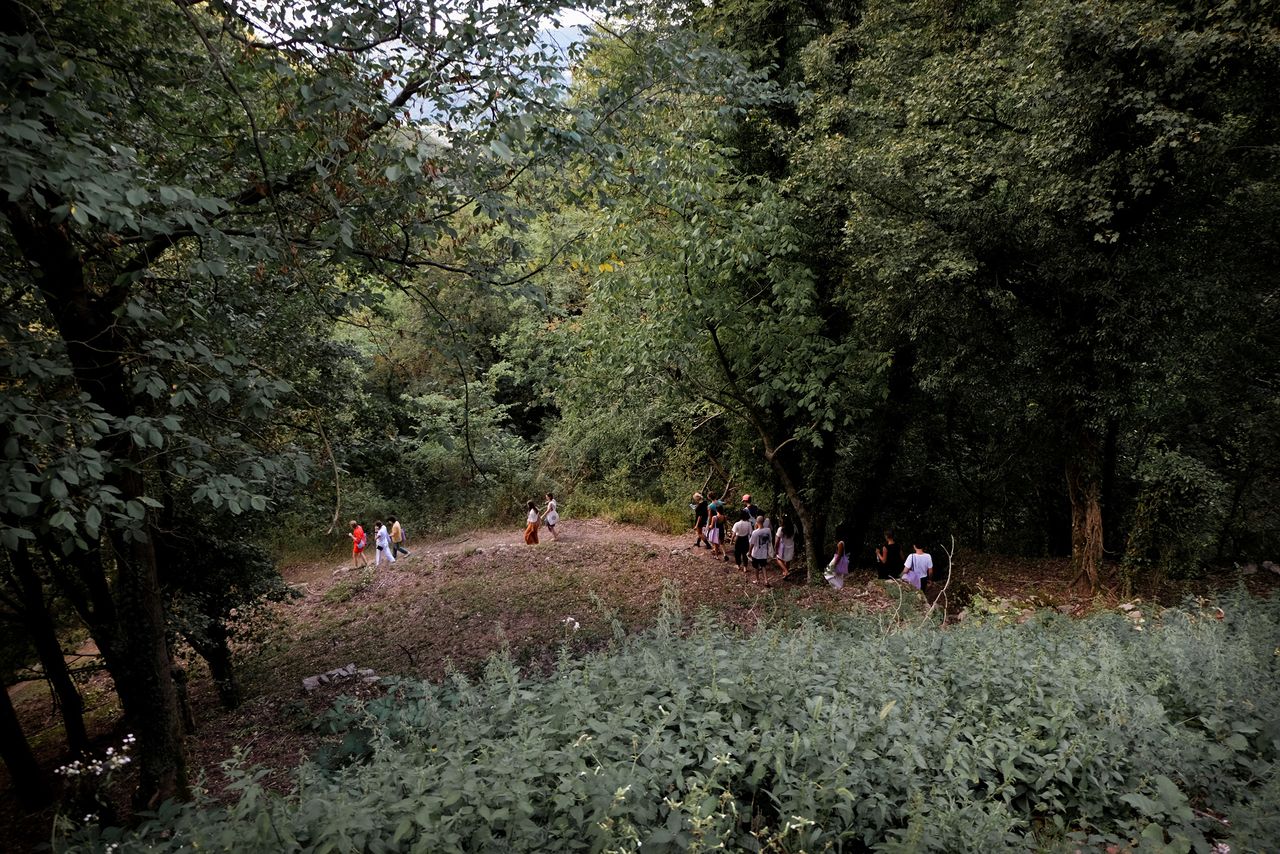 Summer school of the Academy of Margins, a collective learning experience in the village of Topolò (summer 2022). The summer school opened with an explorative walk of the landscape surrounding the village.
Summer school of the Academy of Margins, a collective learning experience in the village of Topolò (summer 2022). The summer school opened with an explorative walk of the landscape surrounding the village.
According to their own words,
Robida is commitment, dedication, concreteness, care and responsibility.
Robida is a way of learning from scratch to take care of one’s dreams.
Robida is a group of people with a great sense of community.
Robida is a platform for creating a place of belonging.
Robida is a space where to dig deeper into things.
Robida is a place for observation and reflection.
Robida is a project to connect people.
Robida is a place to experiment.
Robida is a laboratory.
Robida is relationships.
Robida is a cure.
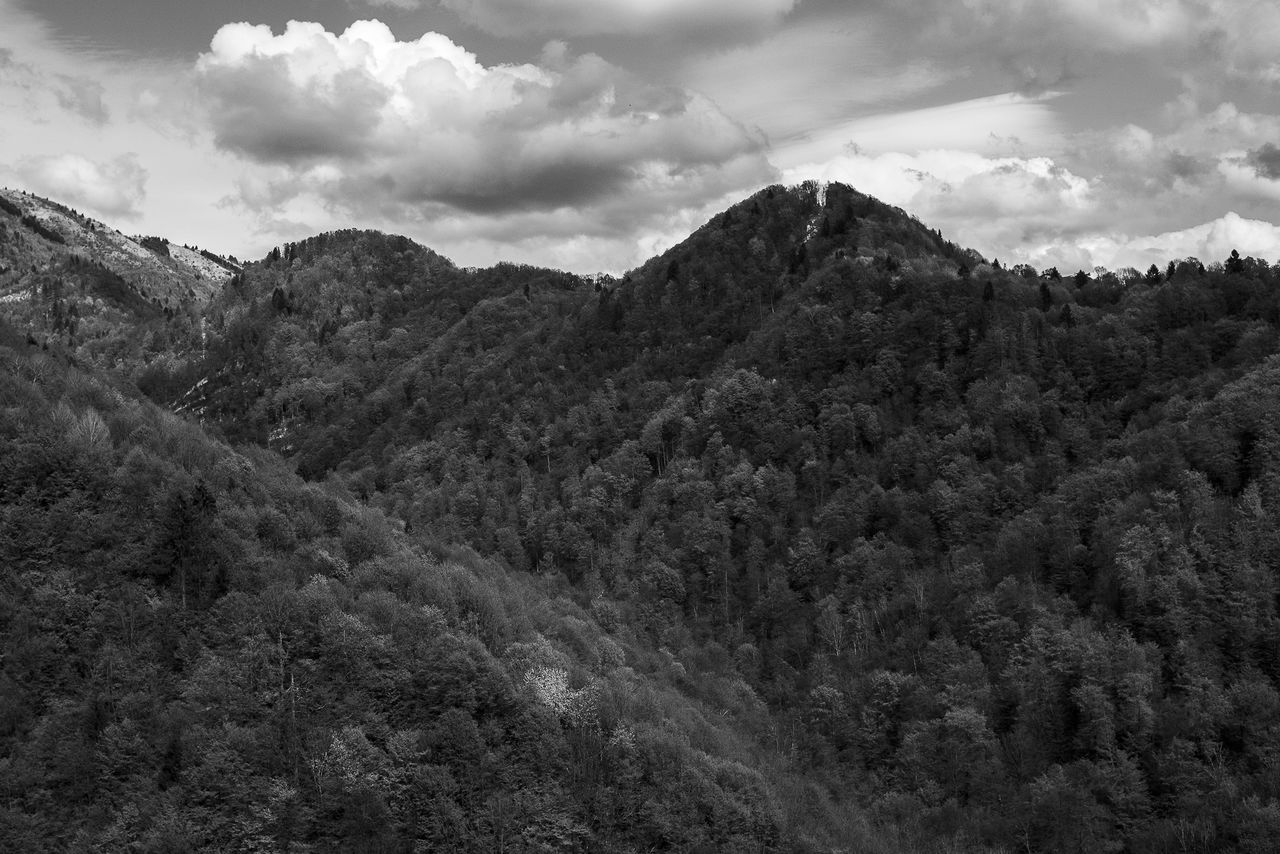 Photo of the mountains that surround the village of Topolò/Topolove (IT) where Robida has
its heartquarter.
Photo of the mountains that surround the village of Topolò/Topolove (IT) where Robida has
its heartquarter.
Robida magazine
Robida issues Robida Magazine annually. It is a multilingual cultural magazine, described by Robida itself as a situated magazine. Each issue works with a specific word that rounds the topic connected to the place of Topolò/Topolove. Contributions are acquired through an open call and are not limited to genre or style, therefore the magazine is a mix of visual materials and written word in various different forms.
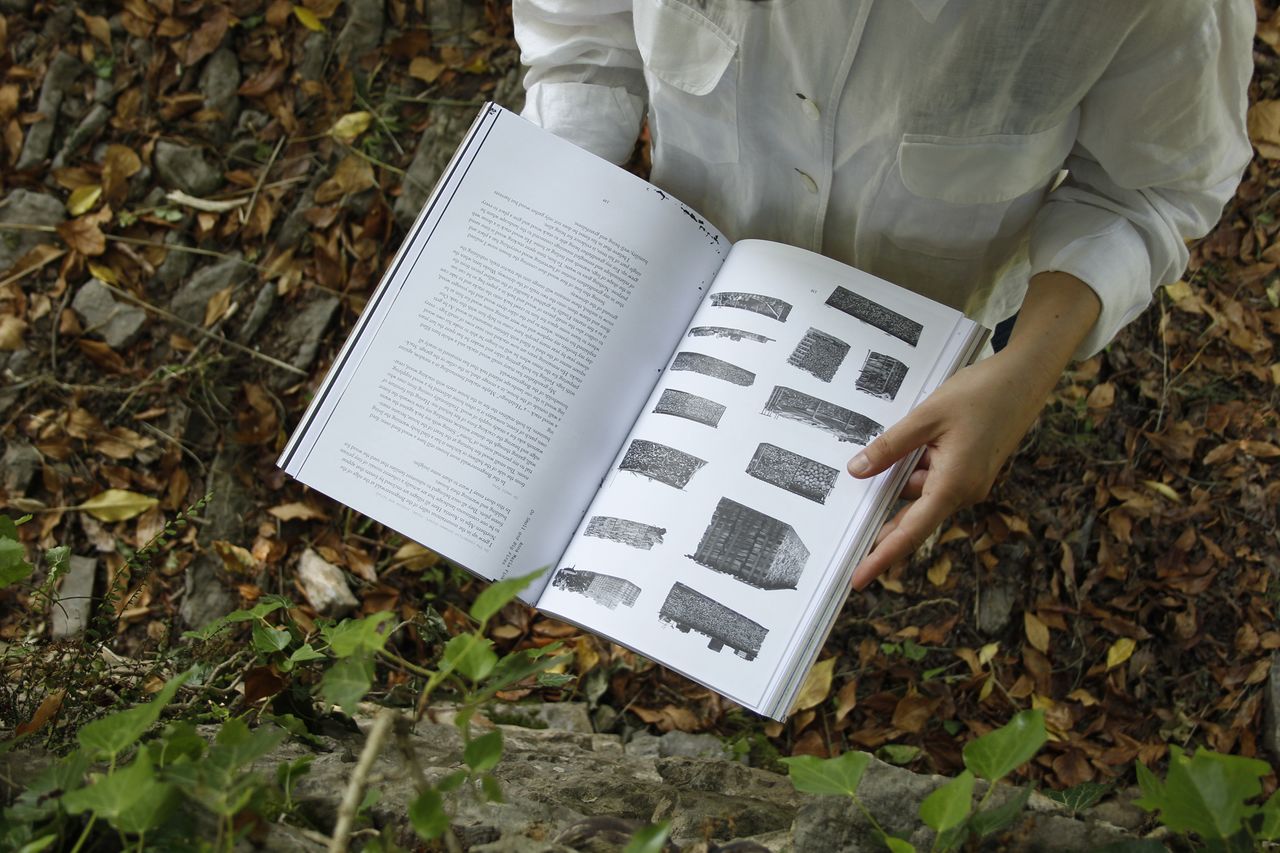 Robida magazine n. 7 (summer 2021), dedicated to the topic of the forest.
Robida magazine n. 7 (summer 2021), dedicated to the topic of the forest.
So far the following issue were published:
Robida 1 (2015): abbandono / zapuščenost / abandonment
Robida 2 (2016): città / mesto / city
Robida 3 (2017): silenzio / tišina / silence
Robida 4 (2018): domestico / domače / domestic
Robida 5 (2018): Topolò/Topolove
Robida 6 (2019): gioco / igra / play
Robida 7 (2021): foresta / gozd / forest
Robida 8 (2022): isola / otok / island
Robida 9 (2023, work in progress): suolo / prst / soil
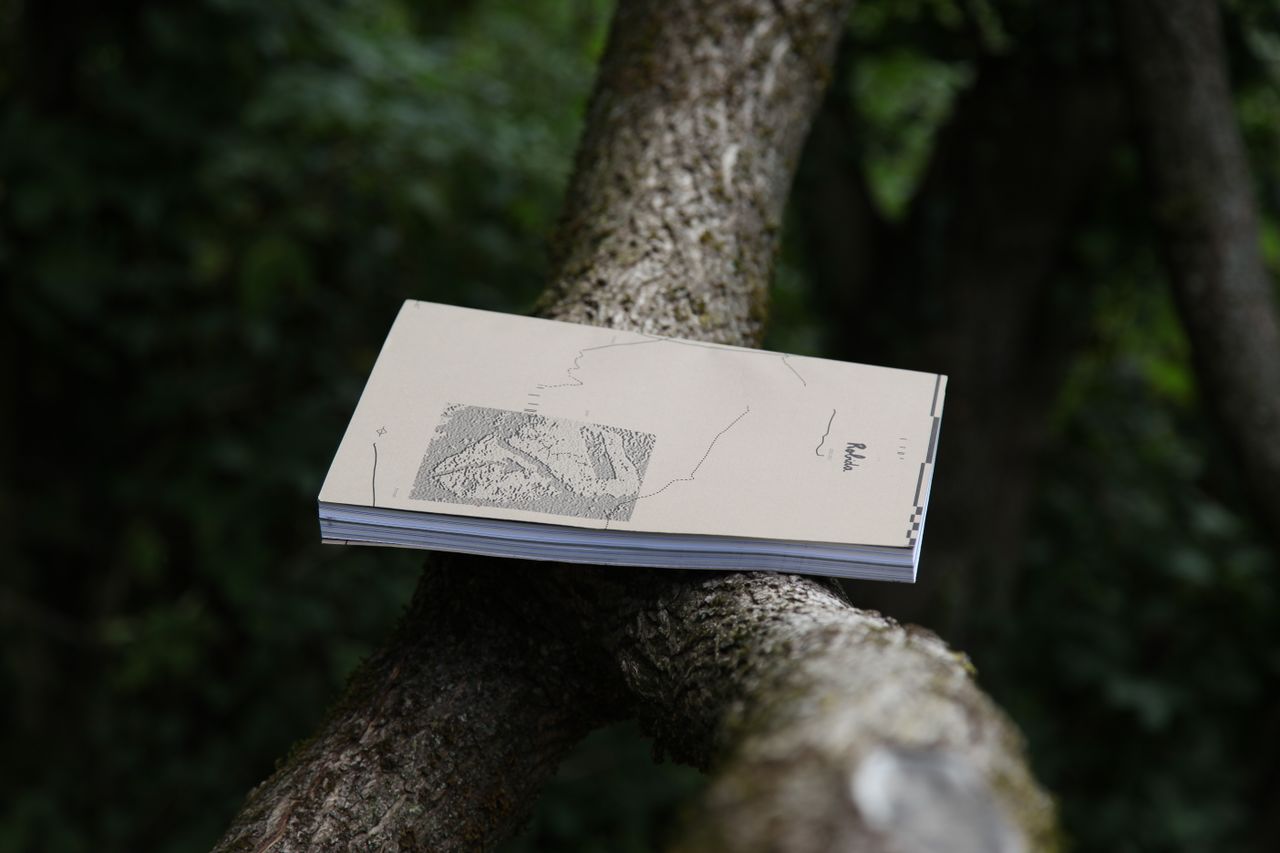
Radio Robida
Radio Robida was established quickly after the workshop Hearing the Margins, which took place in mid-September 2021 in Topolò/Topolove. Since then, it has been narrowcasting every second Saturday. The idea behind the Robida collective's radio station is to use it as a way to stay in touch with their broader community during times when they are not physically together. The underlying theme of Robida's radio programme is the margin, presented through soundscapes such as field recordings from their surroundings, drawing sessions, or casual morning talks. Their studio is a mobile entity, thus Radio Robida can be transmitted through a mobile phone on the field at the edge of the village.
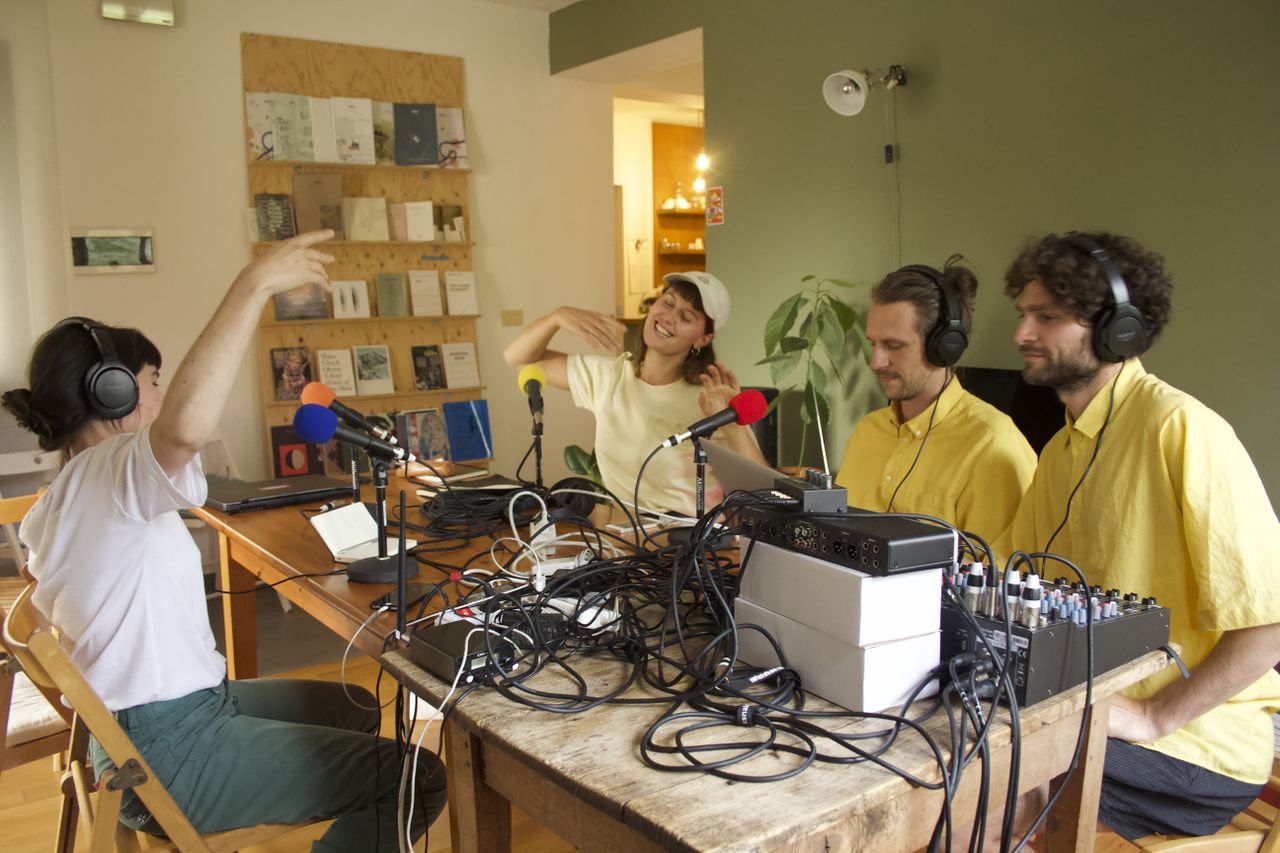 Workshop Hearing the Margins during which the collective opened its own radio, Radio Robida (Topolò/Topolove, summer 2021).
Workshop Hearing the Margins during which the collective opened its own radio, Radio Robida (Topolò/Topolove, summer 2021).
Residencies and Summer Schools
The residency program organized by Robida differs from the traditional concept of artist residency. Instead of adhering to established norms, the idea of a Robida residency was collectively developed during a symposium titled Care of Margins held in September 2021. The symposium brought together around thirty international artists, architects, curators, and researchers, who emphasized the importance of reciprocity, involvement in the existing community, and shared responsibility for the community. Robida residency encourages a fluid and dynamic exchange, where residents can come and go, becoming a part of the wider Topolò/Topolove ecosystem.
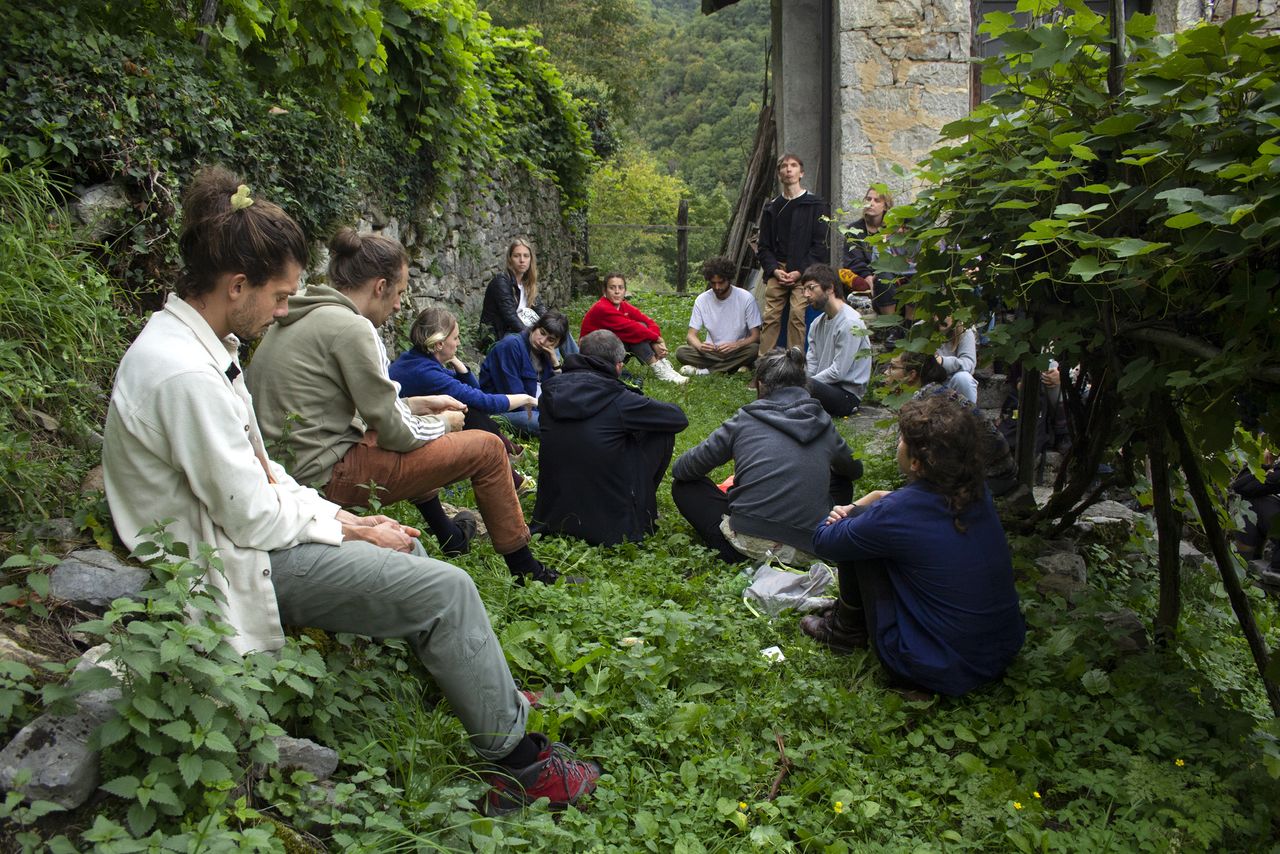 Symposium Care of Margins (Topolò/Topolove, September 2021) organised by Robida. A collective moment to re-think the format of artist residencies with art practitioners, professors, curators and designers from all Europe.
Symposium Care of Margins (Topolò/Topolove, September 2021) organised by Robida. A collective moment to re-think the format of artist residencies with art practitioners, professors, curators and designers from all Europe.
Summer School of the Academy of Margins as a relatively new project of Robida, took place for the first time at the end of the summer in 2022. The program lasted for a week and included lectures, workshops, reflections, and exploration of the surroundings of Topolò/Topolove village. The main emphasis of the program was on exploring the possible meanings behind the concept of care.
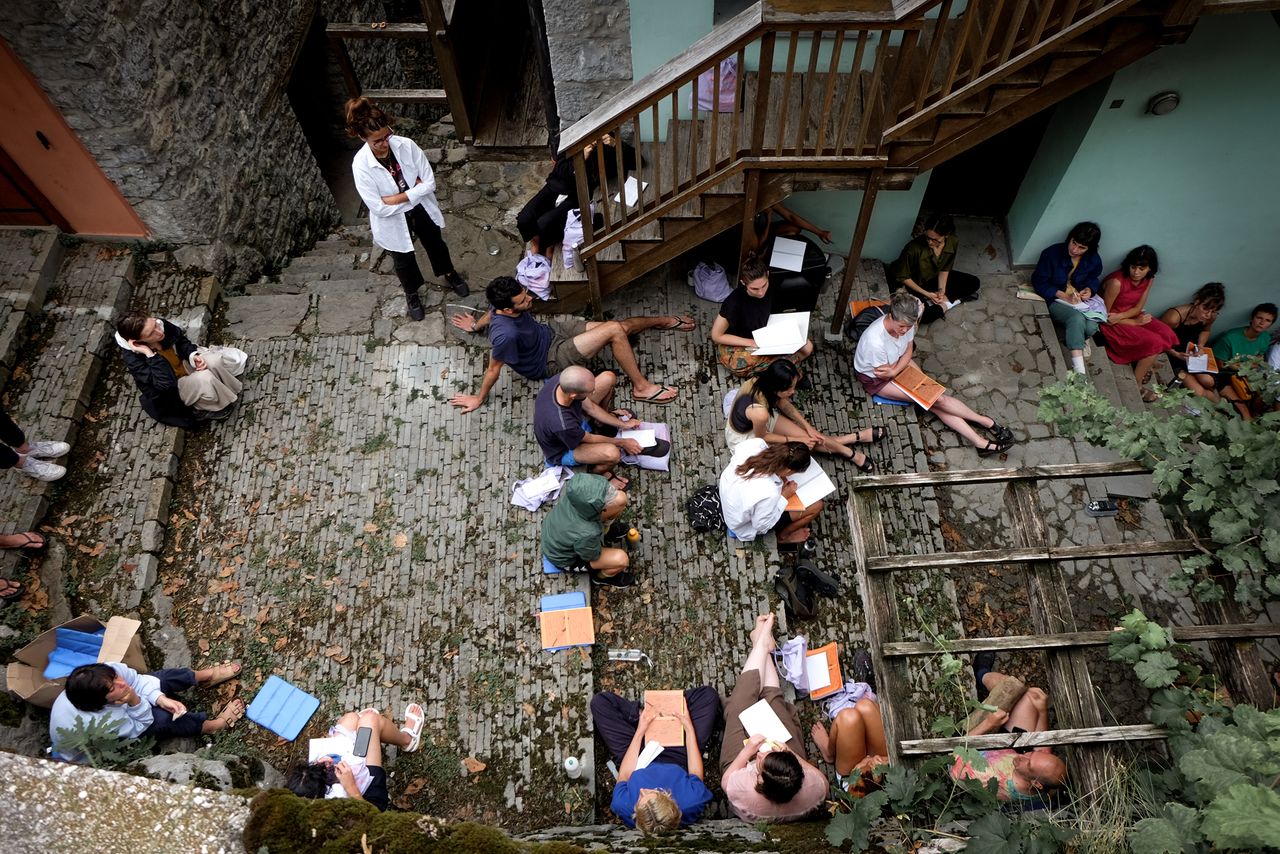 Summer school of the Academy of Margins, a collective learning experience in the village of Topolò (summer 2022). Lecture of the curator Jennifer Teets and the artist Lorenzo Cirrincione about edible clays.
Summer school of the Academy of Margins, a collective learning experience in the village of Topolò (summer 2022). Lecture of the curator Jennifer Teets and the artist Lorenzo Cirrincione about edible clays.
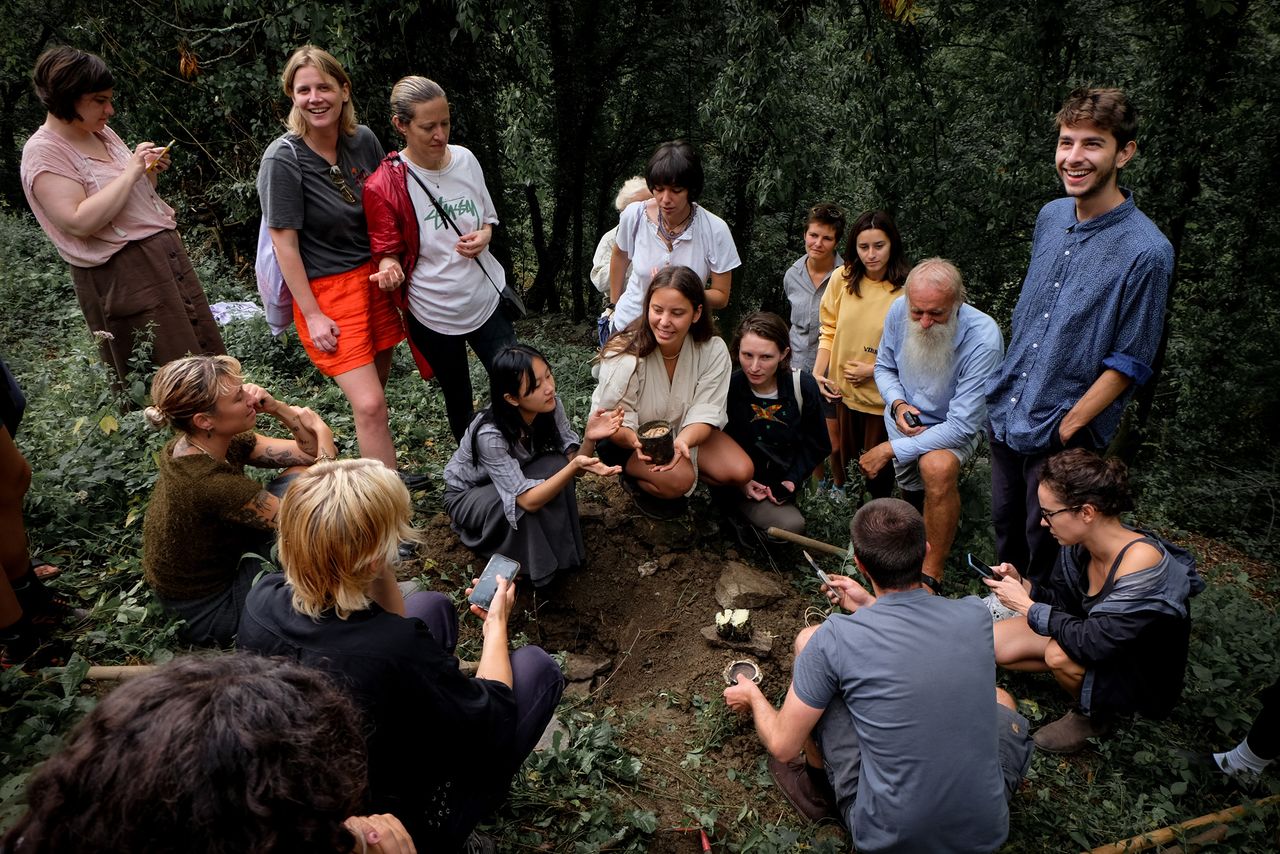 Summer school of the Academy of Margins, a collective learning experience in the village of Topolò (summer 2022). Butter-tasting experience, guided by Philipp Kolmann and the scholar René Nissen.
Summer school of the Academy of Margins, a collective learning experience in the village of Topolò (summer 2022). Butter-tasting experience, guided by Philipp Kolmann and the scholar René Nissen.
Izba
Izba is a collective space run by the Robida collective, which serves as a co-working place, coffee shop, radio station, and event venue. The space comprises a reading room and a spacious kitchen, where food for numerous people can be prepared. It is situated in the heart of the village, beneath the church. The name "izba" is derived from the traditional term for a heated room in a house, which served as a gathering place for socializing and conviviality.
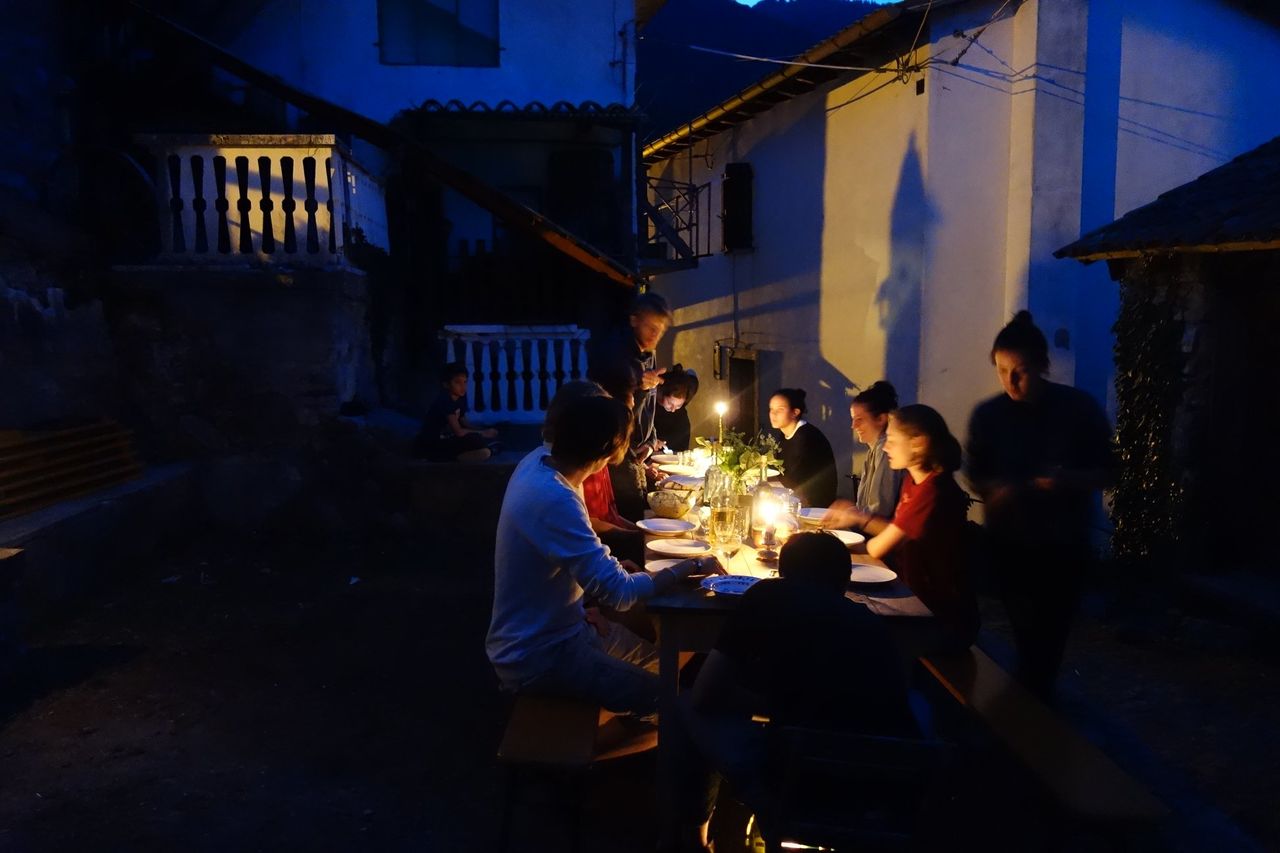 Common dinner of Robida collective.
Common dinner of Robida collective.
Topolò/Topolove
Topolò, or Topolove in the Slovene version of the name, is a secluded village located in the Benečija region, just half a kilometer air distance from Slovenia. Despite its proximity to the border, getting there can be challenging due to the winding local road that leads to the village's church, the last stop. With only 22 inhabitants, Topolò/Topolove has experienced depopulation since the late 19th century when it had almost 500 people. The difficult employment conditions and the region's history as a battleground during the Frist and Second World Wars, and the subsequent difficult times of Cold War, all contributed to emigration. Today Topolò/Topolove is considered one of the most beautiful Italian villages, with traditional stone houses, wooden balconies, and outer staircases. The restoration of the village was made possible mostly through funds from the European Union, supporting niche tourism.
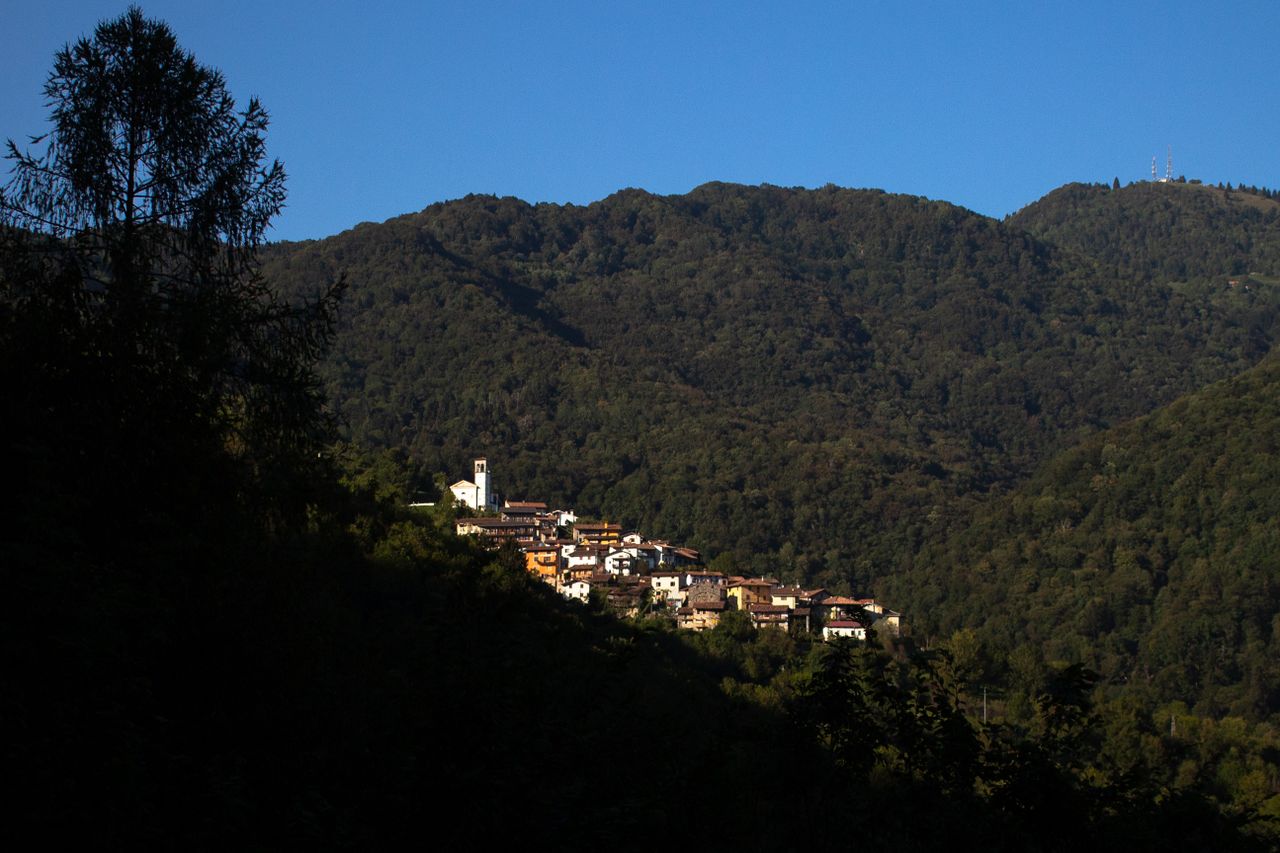 The village of Topolò/Topolove (IT), municipality of Grimacco (Udine): the village counts
today 25 inhabitants, 6 of them are active members of Robida collective.
The village of Topolò/Topolove (IT), municipality of Grimacco (Udine): the village counts
today 25 inhabitants, 6 of them are active members of Robida collective.
Robida is not the first art project to be held in Topolò/Topolove. Since 1994, the Stazione di Topolò/Postaja Topolove festival had been organized every year in July until its supposed last edition in 2022. The festival was an experiment in the dimensions of time and space, as events were given vague descriptions such as "after sunset" or "in the dark," and locations were newly created imaginary places in and around the village, such as embassies - for example, The Embassy of the Erased. The festival brought numerous artistic interventions, collaborations, and performances to the village and had a significant influence on the younger generation, including the Robida Collective. The 2018 special edition of Robida Magazine was thus dedicated to Topolò/Topolove and Postaja for its 25th anniversary.
See also
External links
- Robida Collective on are.na
- Interview: Robida, when the magazine really creates community, Frab's Magazines & More
- Vse ptice postaje Topolove, Radio Študent (in Slovenian)
- Hoja po robovih, Radio Študent (in Slovenian)
Gallery
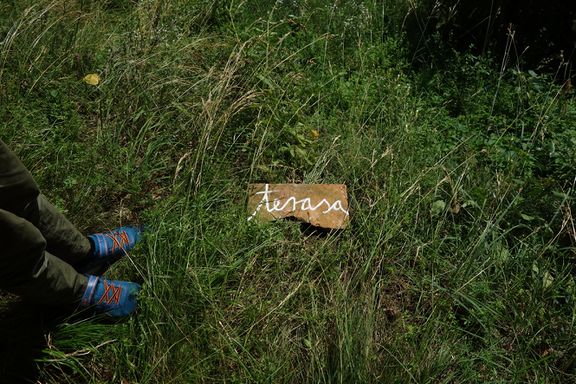 Project Izgubljene poti in besede (Forgotten Paths and Words) by Janja Šušnjar (Topolò/
Project Izgubljene poti in besede (Forgotten Paths and Words) by Janja Šušnjar (Topolò/
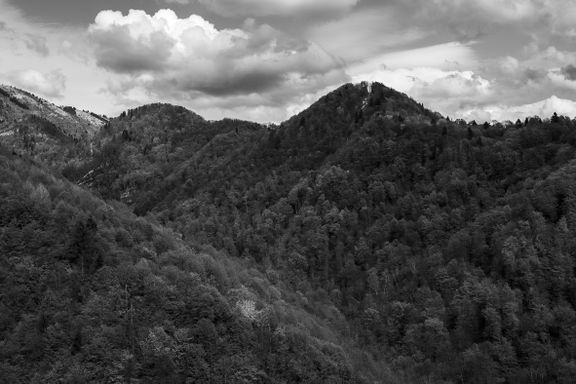 Photo of the mountains that surround the village of Topolò/Topolove (IT) where Robida has
Photo of the mountains that surround the village of Topolò/Topolove (IT) where Robida has
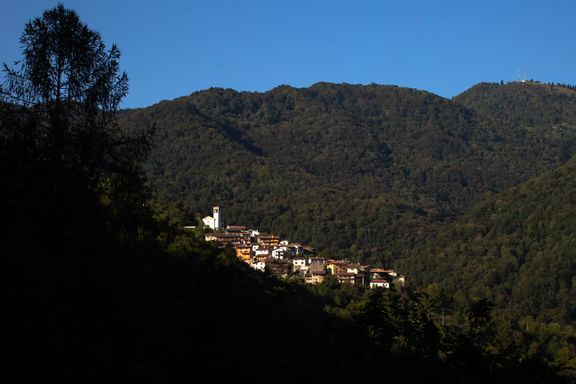 The village of Topolò/Topolove (IT), municipality of Grimacco (Udine): the village counts
The village of Topolò/Topolove (IT), municipality of Grimacco (Udine): the village counts



